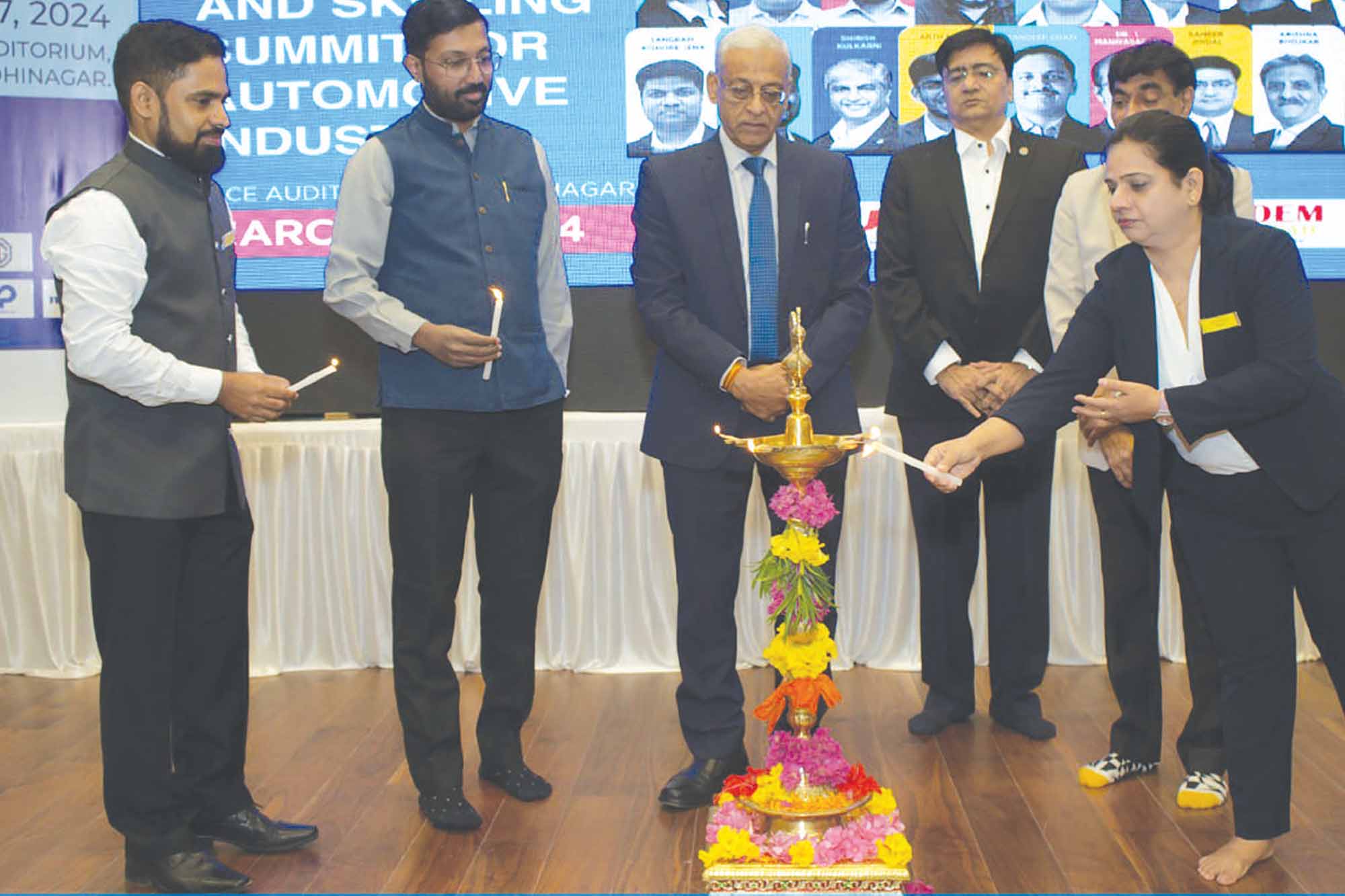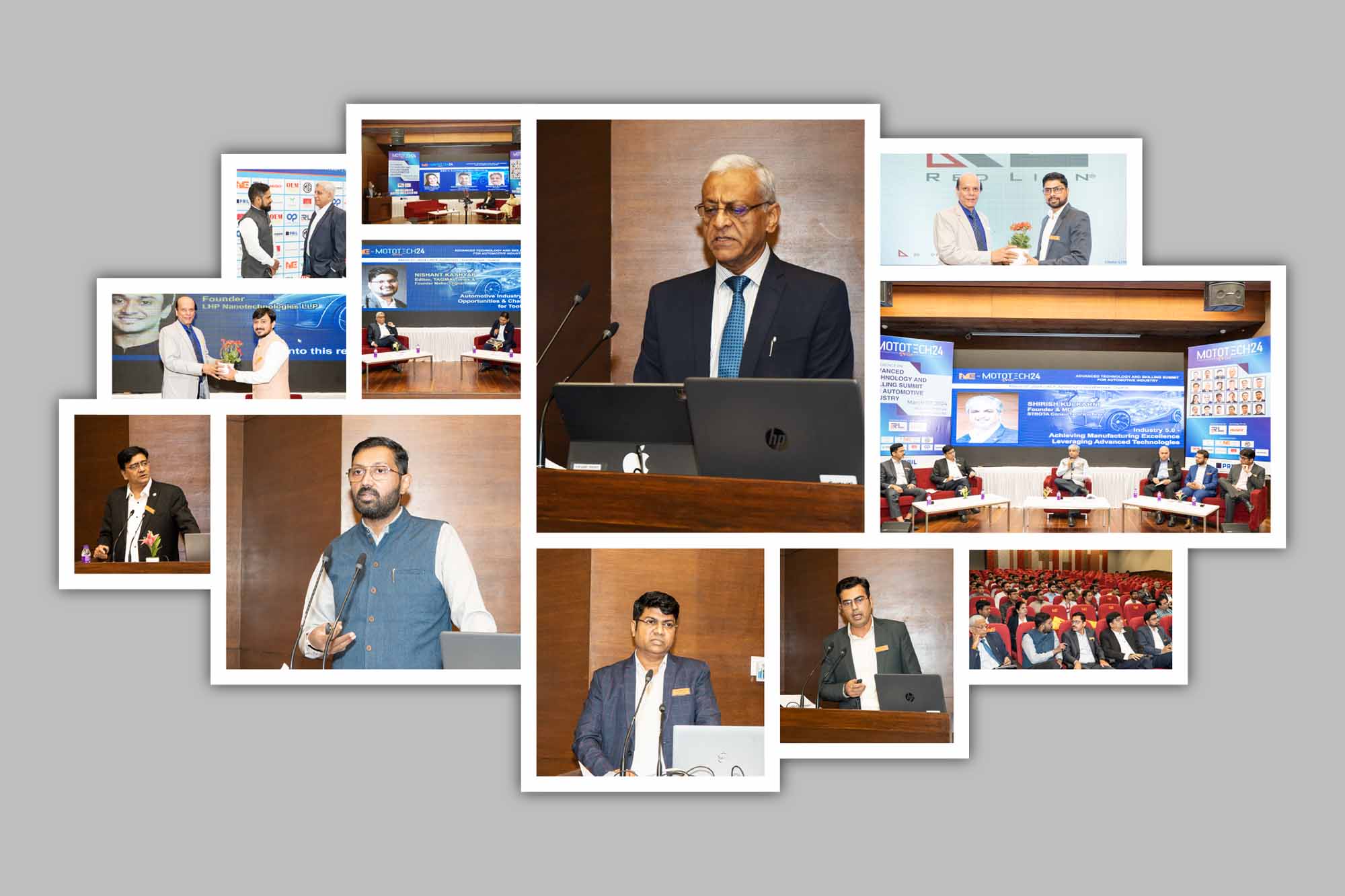iACE MOTOTECH24 Gujarat summit calls to accelerate automotive technology and skilling
10-Apr-2024 11:41 am
10-Apr-2024 11:41 am

iACE MOTOTECH24, Gujarat, was held at the iACE Auditorium in Gandhinagar on March 7. It showcased Gujarat’s automotive excellence and technological and skilling advancements.
Gujarat, renowned for its robust auto hubs in Ahmedabad-Sanand, Mandal-Becharaji, Hansalpur–Vithalpur, Vadodara-Halol, and Rajkot, hosted a significant event in the automotive industry. Organised as a joint venture between the International Automobile Center of Excellence (iACE), the Government of Gujarat, Maruti Suzuki India Limited, and MOTOTECH24, this one-day summit focused on “Advanced Technology and Skilling for the Automobile Industry.” iACE, a premier academic institution, plays a vital role in nurturing and producing industry-ready talent.
The event explored advanced manufacturing technologies and trends shaping the automotive landscape for Original Equipment Manufacturers (OEMs) in Gujarat. Following the path set by the inaugural MOTOTECH 2023 event in Pune, the current summit emphasised skill development alongside technological advancements in the automotive sector. Esteemed industry experts from various sectors, including Auto OEMs, Auto Parts Manufacturers (Tier 1, 2, 3), Machinery, Tools & Accessories Manufacturers, Die & Mould Manufacturers, and Manufacturing Software Service Providers participated in the event. They discussed the technological advancements and the skills required to align with the transition from traditional technology to Industry 4.0 in the automotive industry.
Delegates included MDs & CEOs, CTOs, VPs & GMs of Manufacturing, Production Heads, Design and R&D Heads, Plant Heads, Technical Directors, QC Heads, and engineering students.
The conference commenced with a traditional lamplighting ceremony inaugurated by Rajiv Gandhi, E. Rajiv, Radha Poptani, Sameer Jindal, Mayank Verma, Prasad Nair, and Sagar Tamhane. Following this, Conference Chairman Rajiv Gandhi, CEO of iACE and Executive Board Member of Maruti Suzuki India Limited, delivered a keynote address. He stressed the importance of collaboration within the manufacturing ecosystem, highlighting the necessity for MSMEs to adapt to digitalisation and embrace technologies like Industry 4.0. He cited Maruti Suzuki’s development of a chatbot for manufacturing assistance as an example.

During his keynote address, E Rajiv, Executive Director of iACE, expressed, “iACE MOTOTECH24 Gujarat is extremely iACE MOTOTECH24 Gujarat summit calls to accelerate automotive technology and Skilling iACE MOTOTECH24, Gujarat, was held at the iACE Auditorium in Gandhinagar on March 7. It showcased Gujarat’s automotive excellence and technological and skilling advancements. April 2024 n 93 comprehensive, encompassing various aspects of auto manufacturing and addressing skill development, a theme echoed by all speakers. The automotive industry is witnessing a significant inflexion point, marked by technological advancements and disruptions. The increasing market share of electric vehicles accelerates this. This changing landscape for traditional OEMs, with government involvement, necessitates extensive upskilling efforts.”
The event was graced by distinguished speakers presenting technological insights on various subjects. Divyesh Kolwadkar, Sales Area Manager – West Region at Red Lion Controls, discussed OT-IT convergence and digitalisation in the automotive sector. Sangram Kishore Jena, India Head Automotive & Key Account Sales Manager – SAARC at Husky Injection Moulding Systems India Pvt Ltd, presented Husky’s innovative solutions for hot runners and temperature controllers in the automotive industry. Nanthakumar V, AGM (Head) Product Tooling Design & Development, Mould Maintenance, Plant Utilities at Toyoda Gosai, talked about localisation trends aiding auto OEMs. Neel Panchal, Founder of LHP Nanotechnologies LLP, delved into Graphene – its properties and applications. Sameer Jindal, Director at MG Motor, took us through the foray of MG Nurture and how this OEM is thriving in Indian industry. Sachin Sanghi, Principal Architect – Manufacturing at Google Cloud, showcased how technology & artificial intelligence can re-imagine the automotive business. Dr. Manivasangam, Head of Technology Services & Director at 3D Engineering, presented how software technologies can be leveraged for design & manufacturing. Amber Awana, Plant HR Head at Plastic Omnium Auto Inergy India Pvt Ltd, briefed on trends in labour relations & compliance challenges in the automotive industry.
A lively panel discussion chaired by Shirish Kulkarni, Founder & MD of Strota ConsulTech Pvt Ltd, revolved around Industry 5.0 – Achieving Manufacturing Excellence Leveraging Advanced Technologies. The panelists included Arth Patel, CEO of Tirex Chargers; Sandeep Chati, General Manager of Operation at Ford; Raj Mehta, Founder & Managing Director of Greta Electric Scooters; Vipul Bajpai, Vice President (Business Development) at Vecmocon Technologies; and Sameer Jindal, Director at MG Motor.
A Fireside Chat on Automotive Industry Shifts: opportunities and challenges for Toolmakers between Nishant Kashyap, Editor of TAGMA Times and founder of MAFTEC, and DK Sharma, Consultant—business
Transformation, shed light on the role of Toolmakers in the automotive industry. Another engaging Fireside Chat discussed ESG In Automotive Manufacturing between Krishna Bhojkar, Partner at Bhojkar Consulting; Tanu Ahuja, Senior Director at ACMA; and Siddharth Mohantty, Co-Founder of TWIKK.
The event concluded with an invitation to iACE MOTOTECH24, Pune, scheduled for September 27, 2024. The upcoming conference will further explore the future of the Automotive Industry in India. Interested parties are encouraged to participate and engage in influential conversations that will pave the way for automotive technology advancements in the country.
————————————-
Rajiv Gandhi, CEO, International Automobile Centre of Excellence & Executive Board Member, Maruti Suzuki India Limited
“Collaborating the entire manufacturing ecosystem is crucial as the mindset is the biggest hurdle faced by the automotive industry.
E. Rajiv, Executive Director, International Automobile Centre of Excellence
“As the traditional ecosystem in the auto industry undergoes a transformation, a surge in electrical utilisation has emerged, propelled by investments in semiconductors and related technologies. This shift necessitates mechanical engineers upgrading their skills and embracing proficiency in electrical equipment.”
Mayank Verma, Assistant Director – National Productivity Council, Government of India
“Government, Industry, and Academia must collaborate to bridge the skills gap. Through secure employment practices and policy revisions, we build a resilient workforce for the future.”
Divyesh Kolwadkar, Sales Area Manager – West Region, Red Lion Controls
“At Red Lion, our dedication to Industry 4.0 solutions dates back to 1972. We have empowered the automotive industry with digitalisation. By bridging OT to IT devices, we drive innovation for a smarter automotive future.”
Shirish Kulkarni, Founder & MD, Strota ConsulTech Pvt Ltd.
“India’s two-wheeler industry is evolving indigenously while eyeing global exports. Transitioning to electric vehicles by 2030 poses ecosystem challenges, but Indian OEMs prioritise product development for quality and reliability, meeting tough customer standards.”
Arth Patel, CEO, Tirex Chargers
“For the future of charging, diverse innovations like battery swapping, wireless and inductive charging, and pantographic solutions for larger vehicles are emerging. This evolving ecosystem may take 5 years to establish a robust solution for the next 25 years.
Sandeep Chati, General Manager Operation, Ford
“Cobots represents our vision for cost efficiency, yet overcoming ROI challenges remains a key feature. It’s about striking the right balance between innovation and financial sustainability in the automotive industry.”
Raj Mehta, Founder & Managing Director, Greta Electric Scooters
“Government homologation is needed for vehicle retrofitting and scrapping initiatives. Retrofitment, particularly in two-wheelers, is made more accessible and affordable, ensuring seamless adoption of sustainable transportation solutions.”
Vipul Bajpai, Vice President (Business Development), Vecmocon Technologies
“Electric vehicles are shaping a new era of detailed design and digital traceability in manufacturing. With the advent of batteries, we can see a surge in business opportunities, which are crucial for integrating functional safety in EV components.”
Sameer Jindal, Director, MG Motor
“The MG Hector embodies indigenous design tailored to over 75 technological features, catering to specific needs. Through MG Nuture, we introduced user-centric technologies, customising the automotive experience for the Indian market.”
Sangram Kishore Jena, India Head Automotive & Key Account Sales Manager – SAARC, Husky Injection Moulding Systems India Pvt Ltd
“With an eye on India’s booming automotive market, we at Husky Technologies aim to launch innovative products for enhancing manufacturing efficiency, reducing costs, and accelerating cycle times in the automotive industry.”
Nanthakumar V, AGM (Head) Product Tooling Design & Development, Mould Maintenance, Plant Utilities – Toyoda Gosa
“Collaborations between OEMs and suppliers during testing and evolution have significantly reduced lead times for vehicle launches. The localisation boom is fueling this transformation, driving efficiency across the automotive industry.”
Neel Panchal, Founder, LHP Nanotechnologies LLP
“Graphene, a two-dimensional wonder, blankets surfaces with remarkable conductivity and antimicrobial properties. Its water-repelling nature and myriad applications render it indispensable in revolutionising the automotive industry.”
Nishant Kashyap, Editor TAGMA Times & Founder, MAFTEC
“With automotive exports growing at an impressive rate of 43% annually, the Indian automotive industry is poised to generate numerous opportunities. With this we need to recognise that none of this progress can be materialised without the essential foundation of tooling.”
DK Sharma, Consultant – Business Transformation
“In the automotive industry’s evolution, I’ve witnessed the profound expertise of toolmakers stifled by ecosystem constraints. However, localisation efforts are narrowing the gap between OEMs and toolmakers, fostering collaboration and innovation.”
Sachin Sanghi, Principal Architect – Manufacturing, Google Cloud
“If we examine the trajectory of technological advancements over the years, it is evident that they have consistently improved or aided humanity. Therefore, AI should not be viewed as a threat; rather, it can be harnessed similarly to how computers and calculators revolutionised human capabilities through innovation.”
Krishna Bhojkar, Partner, Bhojkar Consulting
“As we strive for environmental friendliness and ESG focus, the rapid growth of the automotive sector necessitates responsible resource consumption. Recognising its intrinsic pollution, the automotive industry must prioritise sustainability to mitigate its environmental impact.”
Tanu Ahuja, Senior Director, ACMA
“We are witnessing a shift from stakeholders to stakeholders in the manufacturing industry. Businesses are now considering the pollution footprint before purchasing machinery. ESG is no longer just a buzzword but an entire agenda where every aspect of ESG factors into supporting businesses. Even consumers are increasingly conscious of the environmental, social, and governance aspects they are engaging with.”
Siddharth Mohantty, Co-Founder, TWIKK
“The auto industry is shifting its focus towards the green with AI and IoT for sustainable manufacturing. Industry 4.0 advancements are bolstering sustainability efforts, yet tracing the carbon footprint remains challenging. Balancing profits and environmental preservation through technology is imperative.”
Dr. Manivasangam, Head of Technology Services & Director, 3D Engineering
“1D simulation is used for confident concept development and performance prediction. The objective is to foresee EV performance during the concept stage and appropriately size the motor and battery.”
Amber Awana, Plant HR Head, Plastic Omnium Auto Inergy India Pvt Ltd
“Organisations providing training can empower individuals with essential manufacturing skills, while government support can amplify this effort, leading to a more skilled and competitive workforce in the industry.”
We use cookies to personalize your experience. By continuing to visit this website you agree to our Terms & Conditions, Privacy Policy and Cookie Policy.
A PROMONIQUE RESEARCH INDIA INITIATIVE